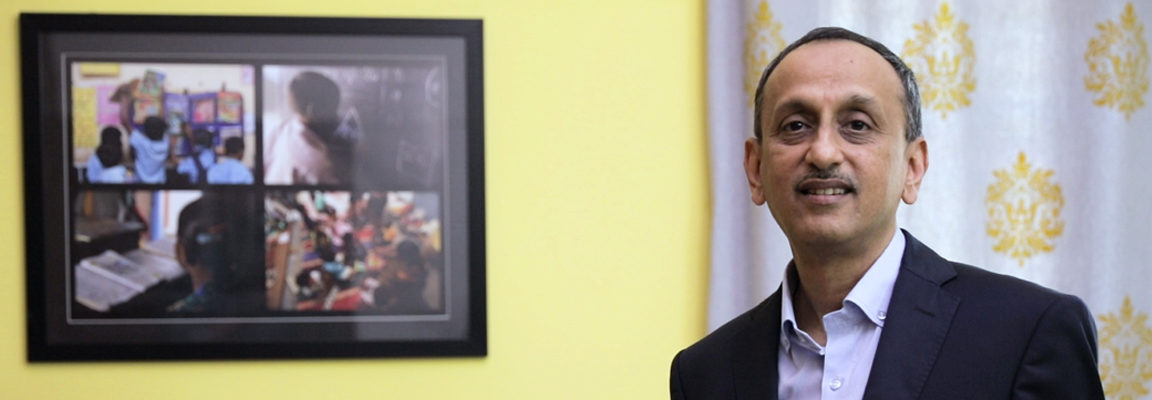


Date : Jun 19 , 2019 | Featured,Opinion
At the peak of his corporate career, Ashok Kamath decided to give it all up to move lock, stock and barrel to the development sector. He had a dream: to change the quality of education in India.
Today, Akshara Foundation, the non-profit he joined 15 years ago and now leads as Chairman, is pursuing that cherished dream. From a non-profit working in a couple of blocks in Karnataka, Akshara now has a significant presence and impact across states. Its Ganitha Kalika Andolana, a unique math program in partnership with state governments and the corporate sector, is currently being run in Odisha and Andhra Pradesh as well. In 2018-19, it impacted over 1.2 million children in government schools and focused on increasing numeracy levels by making math fun and easy.
Ashok, who was recently named ‘Namma Bengalurean of the Year’ for his outstanding contribution to the education sector, reflects on why he does what he does, and how he has made it work.
On March 31, 2019 it was 15 years since I moved into the social development sector. I had worked for nearly 24 years at Analog Devices India and retired from there at age 47. Since then, I have seen, heard and, certainly, learnt a lot. Malcom Gladwell, in his book Outliers, suggests that it takes 10,000 hours of practice to achieve mastery in anything: I have certainly invested that much time and more in trying to find solutions for improving early education.
I am often asked the question: “Why did you choose to be in the social development world when you could have continued a successful journey in the corporate world?”
A debt to repay
I think about this question a lot and there are really only two answers:
First, I was fortunate to have received from society an education at the best institution in the world—the Indian Institute of Technology Bombay —and this education was subsidised by the country.
I had to pay the princely sum of Rs 25 per month as tuition for my education. In the 1970s the country was investing about Rs 55,000 a year on each of us who had joined the IITs and we had to pay less than 1 percent of the total cost. That system allowed me to get an education that gave me the confidence to do well at anything that I chose to do. And that’s a debt of gratitude I had to repay.
Second, having worked in the corporate sector and learnt a lot, I felt it would be a challenging exercise to apply corporate learnings and experience successfully to social good. This is what I have been doing relentlessly for the past 15 years.
Lessons in hope
Over these 15 years I have seen how poor and marginalised communities take a while to trust outsiders like me but when they do begin to trust, they give absolute trust and that places a greater responsibility on me. I have seen how governments function and how they can be effective if they want to be. I have also seen many sceptics who do not believe that supporting government activities in education will make a difference. Over time, I have managed to convince many of them that there is merit in collaborating with governments for larger public good.
As I see more and more people of my generation exploring the social sector, I feel optimistic about the future. I believe that my generation has the skills, the education and the affluence to make change happen and we have an opportunity here. I also believe that future generations will not forgive us if we do not rise to the occasion, make those changes and make society more equitable so that every young person has the opportunity to get the kind of quality education and opportunities that my generation had access to.
Focus on your duty, do your best
I would like to share a couple of lessons that I believe are very important for my friends in the corporate sector who are contemplating switching to the social sector:
Listen, reflect: Listening is an important attitude and reflection is a critical activity to practice in order to succeed in the social sector after spending time in the corporate world. We do not have to be “right” to work for social change. In fact, the arrogance that comes from assuming we are right creates resistance to our goals.
Do your bit, diligently: Once you move into the social sector and as you go about your work, you will occasionally have to confront something you have left behind: that small self, that selfish and self-centred ego (no 5-star hotels or business class travel!). With few sources of reward available, is there any security for the needy ego? And what about the inevitable defeats, let-downs, criticisms and struggles that one has to endure. How does one address it?
The Bhagvad Gita has a possible answer: focus on doing your duty and let the Universe take care of the consequences. Or one can follow the Toltec wisdom from the Four Agreements (Don Miguel Ruiz) and follow specifically the fourth one: Always do your best.
I try to follow both. And am a happier person for that.
Date : Jul 4 , 2024
Date : Jun 27 , 2024
Date : Jun 15 , 2024
Date : Apr 5 , 2024
Date : Mar 28 , 2024
Date : Jan 25 , 2024
Date : Mar 22 , 2023
Date : Mar 15 , 2022